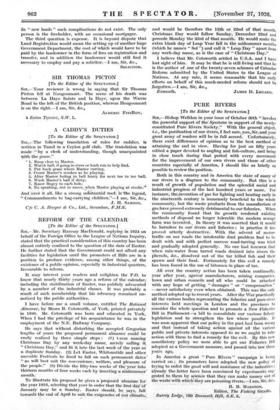PURE RIVERS , [To the Editor of the SPECTATOR.] &a—Bishop
Welldon in your issue of October 30th " invokes the powerful support of the-Spectator in support of the newly- constituted Pure RiVers Society." With the general Object, i.e., the purification of our rivers, I feel sure, you, Sir, and your great army of readers will be in full accord. Unfortunately, there exist differences of opinion as to the best method of attaining .the end in view. Having for just on fifty years edited a ilaper devoted to angling and fish-culture, and being in close touch during that period with every movement for the improvement of our own rivers and those of other countries especially of America, I should like as briefly as possible to review-the position.
Both in this country and in America the state of many of our rivers is a disgrace to the community. But this is a result of growth of population and the splendid social and industrial progress of the last hundred years or more. For instance, thejinvention of gas for lighting and heating early in the nineteenth century is immensely beneficial to the whole community, but the waste products from the manufacture of gas-have proved extremely detrimental to our fisheries. When the community found that its growth rendered existing methods of disposal no longer tolerable the modern sewage farm was invented._ In theory it was asserted that it would be harmless to our rivers and fisheries ; in practice it has proved utterly destructive: With the advent of motor- traffic on our roads the intolerable dust problem had to be dealt with and with perfect success road-tarring was tried and gradually adopted generally. No one had foreseen that when rain-water from tarred -roads drained into rivers the phenols, &c., dissolved out of the tar killed fish and their spawn and their food. Fortunately for this evil a remedy- has been found in the use of bitumen in place of tar.
All over the country action has been taken continually, year after year, against manufacturers, mining companies, town and urban councils and all who could be attacked with any hope of getting " damages " or " compensation " —never satisfactory even when obtained. This was the only method adopted up to recent years. After the War practically all the various bodies representing the fisheries and pure-river interests held meetings in London and the provinces to consider the whole question and to promote a New Fisheries Bill in Parliament—a bill to consolidate our various fishery legislation and to strengthen the law where possible. It was soon apparent that our policy in the past had been wrong and that instead of taking action against all the various public and private interests opposed to us we ought to take action with them to find a remedy for the evil. By this new conciliatory policy we were able to get our Fisheries Bill adopted as a Government measure, and passed into law three years ago,: In America a great " Pure Rivers " campaign is being carried on ; its promoters have adopted the new policy of trying to enlist the good will and assistance of the industries ; already the,latter have been convinced by experiments sug- gested to them by science that they can make money out of the waste with whichl they are poisoning rivers.—I am, Sir; &e.,
R. B. MansTom,
Editor, The Fishing Gazfile• Surrey Lodge, iho Denmark Hill, S.E. 5.


















































 Previous page
Previous page